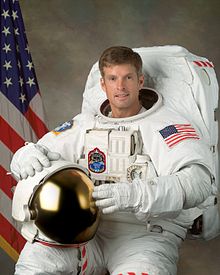Steven Swanson
Steven Swanson | |
|---|---|
 Swanson, September 2006 | |
| Born | Steven Ray Swanson December 3, 1960 Syracuse, New York, U.S. |
| Status | Retired |
| Nationality | American |
| Alma mater | University of Colorado at Boulder Florida Atlantic University Texas A&M University |
| Occupation | Engineer |
| Space career | |
| NASA Astronaut | |
Time in space | 195d 20h 47min |
| Selection | 1998 NASA Group |
Total EVAs | 5 |
Total EVA time | 27 hours, 58 minutes |
| Missions | STS-117, STS-119, Soyuz TMA-12M (Expedition 39/40) |
Mission insignia | |
| Scientific career | |
| Fields | Computer science |
| Thesis | A method and implementation for incorporating heuristic knowledge into a state estimator through the use of a fuzzy model (1998) |
| Website | https://www.steveswansonastronaut.com |
Steven Roy Swanson (born December 3, 1960 in Syracuse, New York) is an American engineer and retired NASA astronaut. Swanson has flown two shuttle flights, STS-117 and STS-119, and one Soyuz flight, TMA-12M. All of the flights were to the International Space Station. He has logged over 195 days in space and completed five spacewalks totaling 28 hours and 5 minutes. Swanson has served in other roles at NASA, such as a CAPCOM for both International Space Station and Space Shuttle missions. His awards and honors include the NASA Exceptional Achievement Medal and the JSC Certificate of Accommodation. Prior to becoming a NASA astronaut, Swanson worked for GTE in Phoenix, Arizona, as a software engineer. He is married and has three children.
Early life[]
Although born in Syracuse, New York, Swanson considers Steamboat Springs, Colorado to be his home. He graduated from Steamboat Springs High School in 1979, and went on to the University of Colorado to receive a bachelor's degree in engineering physics in 1983. In 1986, he received a master of applied science in computer systems from Florida Atlantic University.[1] He later received a doctorate in computer science from Texas A&M University in 1998.[citation needed]
NASA career[]
Swanson joined NASA in 1987 as a systems engineer and a flight engineer working on the Shuttle Training Aircraft. He was selected as an astronaut in May 1998. His first mission was STS-117, which launched June 2007. Swanson was a mission specialist and flight engineer on this flight.[2] He served as a mission specialist and lead spacewalker on STS-119, which launched March 15, 2009 and landed on March 28.[3] He launched to the International Space Station as a member of Expedition 39/40 on March 25, 2014 from the Baikonur Cosmodrome in Kazakhstan and returned to Earth on September 11, 2014.[4][5] NASA announced Swanson's retirement in August 2015. Since then he has worked at Boise State University as a distinguished educator in residence assisting with programs such as the NASA SUITS Program.[6]
Steven Swanson is a Browncoat, or fan of Joss Whedon's Serenity and Firefly. He added copies of the movie and box set of the TV series to the ISS Movie Library on STS-117 in June 2007.[7]
References[]
- ^ "Florida Atlantic University Stories of U." Florida Atlantic University. FAU. Retrieved November 20, 2019.
- ^ Yembrick, John; Clem, Kylie (October 19, 2007). "07-229 - NASA Assigns Crew for Final Solar Array Delivery to Station". NASA News Releases. NASA. Archived from the original on April 28, 2021. Retrieved October 19, 2007.
- ^ Pearlman, Robert Z. (March 28, 2009). "Space Shuttle Discovery Lands After Landmark Flight". Space.com. Future plc. Archived from the original on April 28, 2021. Retrieved April 28, 2021.
- ^ Garcia, Mark (February 12, 2015). "Expedition 39". NASA. Retrieved November 20, 2019.
- ^ "Station Trio Lands Completing 169 Days in Space". NASA.gov. Retrieved September 11, 2014.
- ^ "Three-Time Spaceflight Astronaut Steven Swanson Retires From NASA". NASA. August 13, 2015. Retrieved August 17, 2015.
- ^ "Breaking Atmo: Serenity to ISS on STS-117". Breaking Atmo. Archived from the original on October 23, 2007. Retrieved June 10, 2007.
External links[]
- Steve Swanson Website
- "STEVEN R. SWANSON, NASA ASTRONAUT" (PDF). NASA. Retrieved June 18, 2021.
- 1960 births
- Living people
- American astronauts
- American computer scientists
- University of Colorado alumni
- Florida Atlantic University alumni
- Texas A&M University alumni
- People from Syracuse, New York
- Commanders of the International Space Station
- Engineers from New York (state)
- Space Shuttle program astronauts
- Spacewalkers